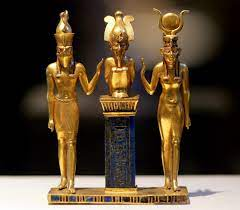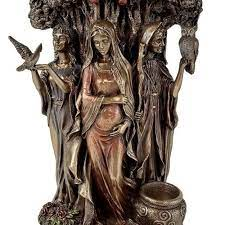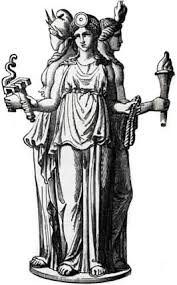J
Johann
Guest
A Positive OutlookI am not denying his pre-existence Johan, because the scriptures tell us plainly that he existed before all things....except his Father.
Some biblical texts positively demonstrate Christ’s divinity. John 1:1-3, mentioned above, first comes to mind: “In the beginning was the Word, the Word was with God, and the Word was God . . . All things were made by him: and without him was made nothing that was made.”
Jesus (the Word before his Incarnation) is revealed to be “God” and the Creator of all things that were created. Genesis 1:1 tells us, “In the beginning God created . . .” The conclusion is inescapable: Jesus is God!
Jehovah’s Witnesses respond by claiming the Greek text actually says “. . . the Word was a god.” They maintain Jesus is here revealed to be a god, not the God because the definite article (Gk. Ho, the) is not used before god (Gk. theos), when referring to Jesus. This line of reasoning has three main problems:
The predicate nominative in Greek normally does not take the definite article. In this verse, then, the lack of the definite article is grammatically consistent. According to the Theological Dictionary of the New Testament, we see another example of this convention in John 8:54, where the predicate nominative is “Father”—again without the definite article preceding (3:105).
The JW’s are inconsistent. They translate the word theos as “Jehovah,” or the God numerous times in their New World Translation of the Bible when it does not have the article preceding it (see NWT: Matt. 5:9, 6:24; Luke 1:35, 2:40; John 1:6,12,13,18; Rom. 1:7,17,18; and Titus 1:1, just to name a few).
Jesus is referred to as theos with the definite article multiple times elsewhere in Scripture.
For example: “But of the Son he says, ‘Thy throne, O God (ho theos, the definite article plus theos), is for ever and ever, the righteous scepter is the scepter of thy kingdom’” (Heb. 1:8).
Jesus is not a god here. He is the God: “Awaiting our blessed hope, the appearing of the glory of our great God and Savior Jesus Christ ” (Titus 2:13, emphasis added—definite article appears in apposition to “great God”). Not only do we see the definite article before theos, but we see the article plus the adjective great. Jesus is not only the God, he is the great God and our Savior.
The Bible is very clear that only Yahweh is both the great God and our Savior. (See Isaiah 41:4, 43:3,11, 44:6,8, 45:21; Hos. 13:4; and Luke 1:47.) Consider too: Thomas answered, and said to [Jesus]: “My Lord and My God” (John 20:28). The Greek text reads “the Lord of me and the God of me.” The definite article before Lord and God leaves no doubt that Thomas—directly addressing our Lord—calls Jesus both the Lord and the God.
What Only God Can Do
“And the Lord God (Gk. ho kurios ho theos, the Lord the God) of the spirits of the prophets sent his angel to show his servants the things which must be done shortly” (Rev. 22:6). Who is the Lord God who sent “his angel” in this verse? Some attempt to say this text is referring to the Father rather than Jesus. However, Revelation 22:16, just 10 verses later, reveals to us who “the Lord God” is who has “sent his angel:” ” I Jesus have sent my angel, to testify to you these things in the churches.” Jesus is clearly “the Lord God of the spirits of the prophets!”
In Luke 12:8-9, angels are called “angels of God”; in Matthew 13:41, angels are called “[Jesus’] angels.” Jesus and God are synonymous. Jesus does what only God can do. He forgives sins by his own authority (see Is. 43:25; Mark 2:5-9). He judges the world in Matthew 25:31-46. This is God’s prerogative according to Genesis 18:25 and Joel 3:12.
Jesus refers to himself with the divine name—I am —in several places. This “I am” formula is a reference back to the Divine Name revealed to Moses in Ex. 3:14. Not only does Jesus refer to himself as “I am” four times in John’s Gospel (see John 8:24; 58; 13:19 and 18:5-6), but when he does so in John 8:58, the Jews to whom he was speaking understood his meaning because they immediately wanted to stone him for blasphemy!
Jesus places his word on the same level as the word of God—the Old Testament. “You have heard it said . . . but I say to you . . .” (see Matt. 5:21-28). This is in sharp contrast to the prophets of old who always made clear the word they were speaking was not their own: “The word of the Lord came unto me, saying . . . ” (cf. Jer. 1:11; Ezek. 1:3, etc.). Only God possesses this kind of authority.
Jesus is referred to as “equal” with God by both John and Paul. In John 5:18, the author comments on why the Jews wanted to kill Jesus: “Because he called God his Father, making himself equal with God.” Paul refers to Jesus when he was “in the form (Gk. morphe; in Greek usage this word means the set of characteristics that makes a thing what it is) of God” thinking “his equality with God” not something to be grasped onto, but emptying himself and becoming man (cf. Phil. 2:6-10). Paul assumes his readers already knew Jesus to be equal with God, the Father.
Jesus is referred to in the New Testament with the title Lord as it is uniquely applied to Yahweh in the Old Testament. Jesus calls himself “the Lord of the Sabbath” in Mark 2:28. The Sabbath is referred to as the “Sabbath of Yahweh” in the Old Testament (cf. Ex. 20:10; see also Is. 8:13, referred to in 1 Peter 3:15; and Joel 2:31-32, quoted both in Acts 2:20-21 and in Rom. 10:13).
The First and Last Point
The final proof of Jesus’ divinity we will consider can be found in the last two chapters of the book of Revelation. According to Revelation 21:6-7, Almighty God reveals himself to us in plain terms: “And he said to me, ‘It is done! I am the Alpha and the Omega, the beginning and the end. To the thirsty I will give from the fountain of the water of life without payment. He who conquers shall have this heritage, and I will be his God and he shall be my son.’”
But then, in Revelation 22:6, 13, 16, we find Jesus revealing himself to be “the Alpha and the Omega . . . the beginning and the end”:
And he said to me, “These words are trustworthy and true. And the Lord, the God of the spirits of the prophets, has sent his angel to show his servants what must soon take place . . . I am the Alpha and the Omega, the first and the last, the beginning and the end . . . I Jesus have sent my angel to you with this testimony for the churches. I am the root and the offspring of David, the bright morning star.”
Jesus is God.
You are dead wrong.
J.





